
Barack Hussein Obama’s historic victory as the 44th President of the United States Of America is being celebrated not only in America, but across the world.
He said in his victory speech that:
This victory alone is not the change we seek. It is only the chance for us to make that change. And that cannot happen if we go back to the way things were.
It can’t happen without you, without a new spirit of service, a new spirit of sacrifice.
So let us summon a new spirit of patriotism, of responsibility, where each of us resolves to pitch in and work harder and look after not only ourselves but each other.
Thus, I leave you with a BBC news clip on how the World is reacting to Obama’s win. As people celebrate across the world, they also offer what they believe this “chance” for “change” means for American foreign relations!

I almost can’t believe it. One newscaster announced “Barack Hussein Obama has just become the 44th President of the United States” and I burst out laughing.
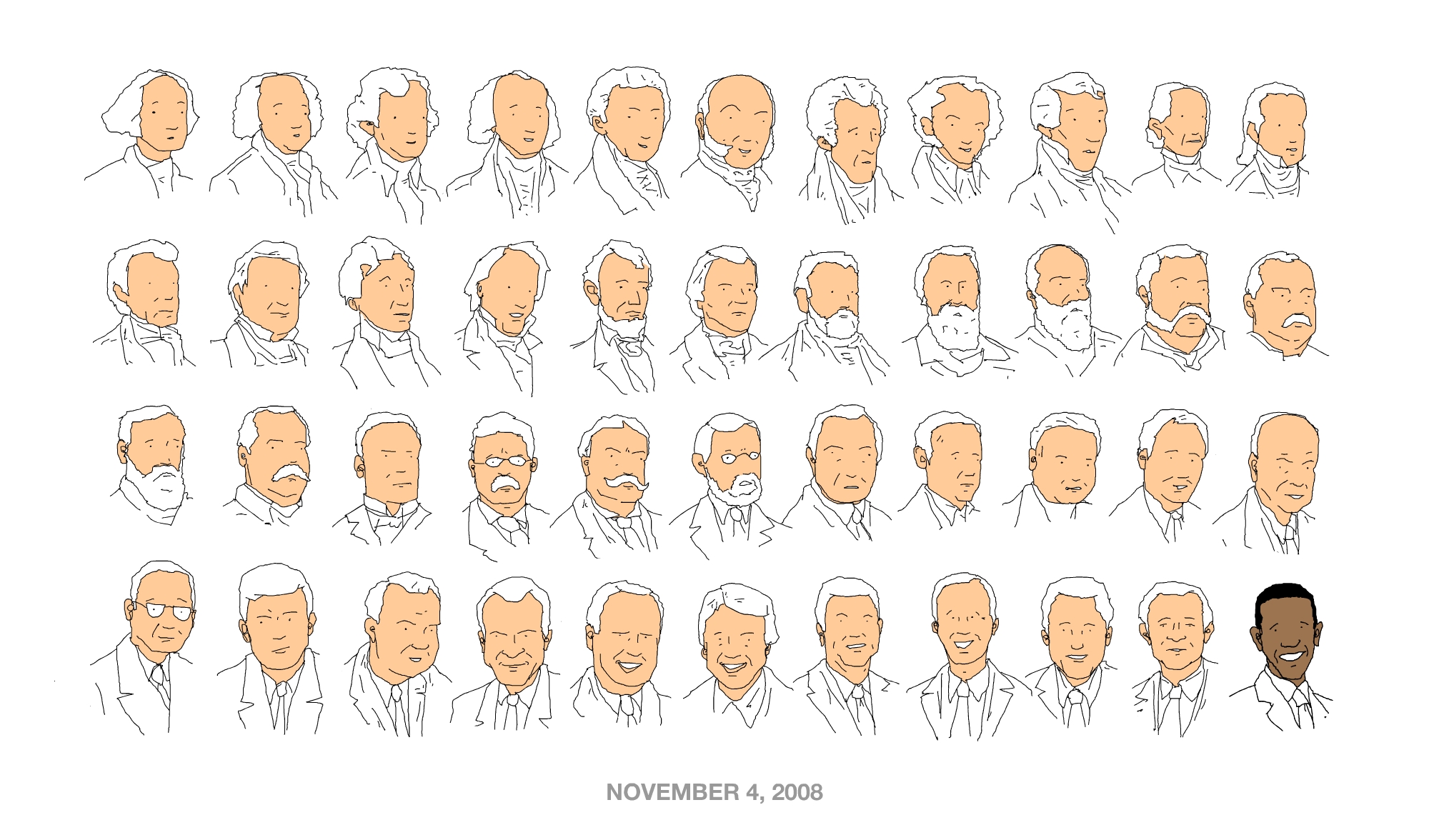
Someone pinch me.
As all the headlines read- history was made last night.
I’m awed by the level of civil participation that we’ve witnessed over the last few months (and for some, since the primaries). Family and friends have been making phone calls, going door to door even yesterday, were poll monitors… it’s been wonderful to witness. One friend was mentioning that in the 60s, they used to protest for really innocuous things- like asking for a law that was already in place to be implemented. But it was the act of organizing that authorities found threatening.
Now I’m curious as to what changes this administration will actually bring, what it will mean for Sikhs, for minorities, for women.
I’m assuming that people have a lot on their minds right now. Let’s try an open thread. Feel free to comment on whatever last night’s results have brought to mind.
(Illustration by Patrick Moberg, thanks Gurpreet for the link!)
Like so many Sikhs and friends of Sikhs, I was in Yuba City that past weekend for what is the closest thing to a “jor mela” that America has to offer.  Lot of colorful Sikhs, lost of seva, and lots of food, lots of people selling lots of things.
Lot of colorful Sikhs, lost of seva, and lots of food, lots of people selling lots of things.
One of the things that I think stood out among the many “lots” and was that there were lots of Sikh t-shirts. People were wearing anything from the “300 Saal Guru De Naal” to t-shirts with famous Sikhs to the Sikh T’s that also happened to say “Happy Birthday Jesse.” Anyhow, the point is that there was a large variety of different t-shirts and this is cool because it show a sense of comfort and identity.
Recently, I read an article discussing how a group of four Sikh teenagers on the East Coast started a line of t-shirts with inside jokes for Punjabi Sikhs. The group, branded Turbaninc, says that their motto is:
As readers may have seen, we’ve been swept up with the elections here at TLH, and many of us are out volunteering and (wo)manning the polls today. As a Sikh-American woman and the daughter of Punjabi immigrants, this day is especially important to me — my right to vote is the product of over 100 years of activism to extend the rights of citizenship to all.
For those who are eligible and registered to vote in the U.S., I hope you’ll take today to cast your ballot. Whether you are voting for President, or for local initiative measures, or for state/local offices, you hav an exceptional opportunity to make your voice heard.
Below is some historical background on the extension of citizenship rights; hopefully it will get you pumped to participate:
- 1868: The Reconstruction Amendments eliminate non-criminal slavery (Amendment 13) and create a Constitutional right — in theory — for former-slaves and their descendants to fully participate in the post-Civil War U.S. (Amendment 15).
- 1913: The 17th Amendment allows for direct election of Senators.
- 1920: After nearly 70 years of lobbying, women win the right to vote.
- 1923: The U.S. Supreme Court revokes the citizenship rights of desi immigrants.
- 1940-47: Congress recognizes Native Americans as citizens, and over the next 7 years states incorporate them into their voting apparatus.
- 1946: Harry Truman gives back the right to naturalize, allowing desis and Filipinos to become citizens, once again.
- 1964: The 24th Amendment eliminates the poll tax (for federal elections).
- 1965: 100 years after Reconstruction, the Congress upholds everyone’s right to vote (including people of color and the poor) and criminalizes voting discrimination/disenfranchisement. It eliminates poll taxes (for state elections), literacy tests, and English-only language requirements.
- 1971: The voting age is lowered to 18.
- 2005: Indiana limits the right to vote to individuals with state/federal ID, only. The Supreme Court affirms their law.
For more information, here’s an annotated timeline of the development of voting and its slow inclusion of non-propertied and non-white individuals, and later women and immigrants.
What are you basing your vote on this election? Whether you think health care is a right or responsibility, concern about a raise in taxes, your belief in diplomacy or American exceptionalism?
What appeals to you about the candidates, what makes you trust them?
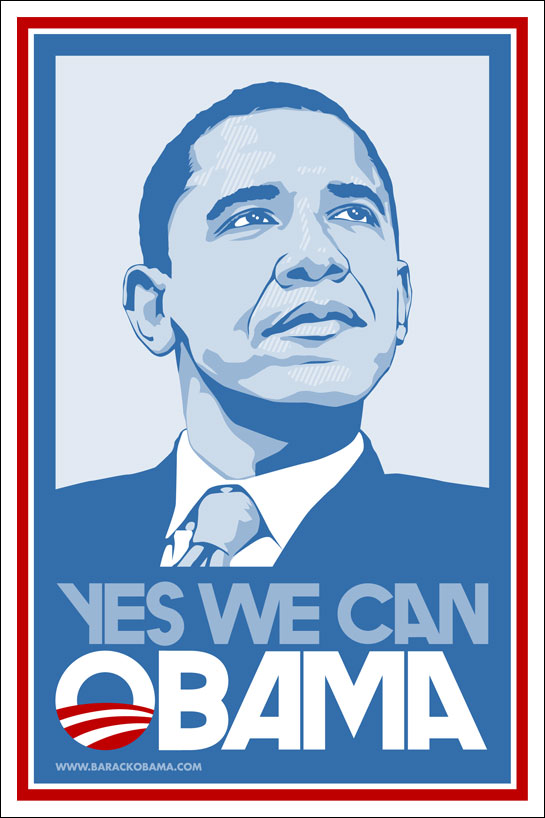 If you do trust either of them, I’d like to point out that you’ve been sold. You’ve bought their product. Does that deep blue of the Obama campaign make you think things are going to be just fine? Sold. Do the appeals to “Joe the Plumber” and “Tito the Builder” make you feel like your needs are heard and understood? Sold.
If you do trust either of them, I’d like to point out that you’ve been sold. You’ve bought their product. Does that deep blue of the Obama campaign make you think things are going to be just fine? Sold. Do the appeals to “Joe the Plumber” and “Tito the Builder” make you feel like your needs are heard and understood? Sold.
How many undecided voters were swayed by packaging? Is that really what votes should be based on?
One political scientist has categorized voters into 4 categories: rationa, intuitive, confirmative, and fast + frugal.
As an UPDATE to my post a couple weeks ago, the Sikh Coalition has released the “2008 Presidential Elections Voter Guide For Sikh Americans”. P.S. McCain never responded … the guide contains some of his answers collected from outside resources (the Coalition became our #1 research assistant)!
According to the Sikh Coalition:
Our candidate questionnaire was provided to both the major party candidates in November 2007. Since then, the Sikh Coalition has provided all candidates multiple and repeated opportunities to answer its questionnaire. Our Voter Guide reflects the answers of the candidates who responded to our questionnaire.
The Sikh Coalition’s Sikh American Voter Guide includes information about how and where to vote on Election Day, summaries of proposed laws that affect Sikh interests, and the presidential candidates’ answers to our questionnaire. Of the 13 candidates running for president of the United States, a total of five responded to the Coalition’s questionnaire – including one of the two major party candidates.
The 25-page guide-book has a brief biographical section on all 13 candidates running for President, along with pictures (Prabhu Singh Khasla … Ralph Nader is represented)! In addition, responses from the candidates on questions addressing:
1) Relationship With Sikhs
2) Hate Crimes
3) Religious Profiling
4) Employment Discrimination
5) Discrimination
6) Asylum
7) Immigration
Check it out! Let’s us know what you think! Make copies and get them out to your sangats at local Gurdwaras before next Tuesday!
Vote On Tuesday (11/04/2008)! You can find your local polling place through Google here!


As the end of election season nears, the months of intense election coverage can get overwhelming. Hearing basically the same messages from both sides gets old. But one thing that’s been remarkable for me to see this election season is the level of civic engagement from a broad spectrum of civil society. For example, the kids in the above video sing a non-partisan song. Check it out. Half of them sing and dance for McCain and the other half for Obama (except for one stanza where they all sing for the Left, not sure why). These 7th grade students from the Ron Clark Academy in Atlanta just made election season enjoyable.
Obama on the left
McCain on the right
We can talk politics all night
And you can vote however you like
You can vote however you like, yeah
 The Sikh American Legal Defense and Education Fund (better known as SALDEF, and SMART before that) has been vigorously defending a turbaned Sikh man, Sukhbir Channa, who was told by Disney that he would not be hired for a position because he did not have the “Disney look.” Angela Bliss, a spokesperson for Disneyland, explained that, “The Disney look is a fresh, clean and approachable look, ensuring that every guest feels comfortable with our entire cast.” Apparently a turbaned Sikh is neither fresh, clean, nor approachable, and makes others uncomfortable. Apparently in a “magical” environment that contains oversized pigs, mice, and other characters, it is a human with a simple religious headdress that is unwelcome. Apparently a major company whose creations are an integral part of practically every American child’s upbringing cannot teach those very children the fundamental values of tolerance, respect, and acceptance in this increasingly diverse and pluralistic nation. Rather than work to alleviate any possible (though not demonstrated) discomfort with a turbaned Sikh, Disney has pandered to and thereby legitimized the notion that turbaned Sikhs are to be marginalized and excluded from aspects of American society. I could go on and on.
The Sikh American Legal Defense and Education Fund (better known as SALDEF, and SMART before that) has been vigorously defending a turbaned Sikh man, Sukhbir Channa, who was told by Disney that he would not be hired for a position because he did not have the “Disney look.” Angela Bliss, a spokesperson for Disneyland, explained that, “The Disney look is a fresh, clean and approachable look, ensuring that every guest feels comfortable with our entire cast.” Apparently a turbaned Sikh is neither fresh, clean, nor approachable, and makes others uncomfortable. Apparently in a “magical” environment that contains oversized pigs, mice, and other characters, it is a human with a simple religious headdress that is unwelcome. Apparently a major company whose creations are an integral part of practically every American child’s upbringing cannot teach those very children the fundamental values of tolerance, respect, and acceptance in this increasingly diverse and pluralistic nation. Rather than work to alleviate any possible (though not demonstrated) discomfort with a turbaned Sikh, Disney has pandered to and thereby legitimized the notion that turbaned Sikhs are to be marginalized and excluded from aspects of American society. I could go on and on.
This week, I learned that another major company informed a Sikh that a turban should not be worn in the presence of customers.
Some ideas are just better communicated through modes other than writing. Theatre, through the unfolding of a story and through the body language of its actors, can sometimes convey meaning and ideas more effectively than just written words alone.
Some Sikh youth from Rockland, MD have decided to use theatre to engage non-Sikhs in learning about Sikhs- a wonderful idea.
Two plays are being planned for the fall expressing themes of diversity, mutual respect, interfaith and justice. They will both be staged on Saturday December 13, 2008 at the Wooten High School in Rockville, Maryland.
Where did this idea come from?
Last fall, Guru Gobind Singh Foundation had some of its kids take part in a play The Lorax, a musical adaptation from the famous Dr Seuss story book which was staged by kids from many different faiths. This play, adopted to create awareness about environment, was coordinated by the Interfaith Conference of Metropolitan Washington and was staged by the Children’s Theater Company of New York.
After going through this experience, GGSF decided to form the Rockville Chapter of Children’s Theater Company last May to explore the possibility of staging a play depicting the concepts of Guru Granth Sahib. Dedicated to “Building Character Onstage”, the Children’s Theatre Company (CTC) of New York develops in children and youth a keen sense of citizenship while introducing them to the incomparable magic of theatre through their full participation in the creation and performance of musicals and plays. [link]
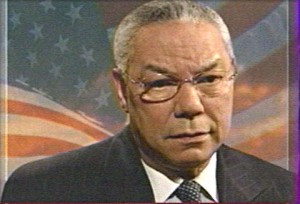 One aspect of the 2008 Election is reminiscent of the Sikh community’s response to the September 11, 2001 terrorist attacks. In the aftermath of that fateful Tuesday morning, Sikhs began declaring that, “we are not Muslims.” Of course, the intention was not to deflect hate or anger towards properly-identified Muslims, but to inform others that Sikhs are members of a separate faith. An implication from the “we are not Muslim” approach, however, was that it was okay to target Muslims. Some Sikhs therefore began asking themselves, ‘what if I was Muslim?’ The answer, of course, is that the discrimination and harassment would still be wrongful. As a result, Sikhs supplemented their statements by not only explaining that they are not Muslims, but openly denouncing hate directed against anyone based on their actual or perceived race or religion.
One aspect of the 2008 Election is reminiscent of the Sikh community’s response to the September 11, 2001 terrorist attacks. In the aftermath of that fateful Tuesday morning, Sikhs began declaring that, “we are not Muslims.” Of course, the intention was not to deflect hate or anger towards properly-identified Muslims, but to inform others that Sikhs are members of a separate faith. An implication from the “we are not Muslim” approach, however, was that it was okay to target Muslims. Some Sikhs therefore began asking themselves, ‘what if I was Muslim?’ The answer, of course, is that the discrimination and harassment would still be wrongful. As a result, Sikhs supplemented their statements by not only explaining that they are not Muslims, but openly denouncing hate directed against anyone based on their actual or perceived race or religion.
In the last few weeks, with Election Day approaching (and political strategies and rhetoric becoming increasingly bold as a result), questions have resurfaced regarding whether Senator Barack Obama is Muslim or Arab. (For example, “When a John McCain supporter at a recent rally said she didn’t trust Obama because he was an Arab, the senator replied: ‘No. He’s a decent family man.'”). The answer, to anyone who has paid attention to the news over the course of the past ten months, is no, Senator Obama is not Muslim or Arab. But the underlying question again is, ‘so what if he was?’
As we decide on the presidential candidate we will vote for this election year, their values, thought-processes, and interactional styles are as important as their policies. I feel regardless of who wins the election, their policies will ultimately change during their presidency. George Bush Senior said he would provide tax-cuts during his presidency and ultimately raised them. Bush Two wanted smaller government, but added the Office of Homeland Security. Bill Clinton promised health-care reform for insuring more Americans, but when he left office “ … there were at least 3 million more people uninsured in the U.S.”. The only stability these candidates can provide us are their values, thought-processes, and interactional styles because, at both of their ages, habits generally don’t change. These habits rooted in personality and experience, will provide insight into what kinds of policy decisions they are more likely to make when policy changes occur during their presidency for various reasons. Each candidate’s current stance on policies during the campaign season and voting record are crucial for providing insight into their values and thought-processes, but they should not be the sole measures for determining who is the better candidate. For example, how they interact at debates is critical because it reveals temperament and interactional style for engaging in “heated” moments we can expect our leader to encounter domestically and internationally, particularly after the state-of-affairs Bush is leaving us with. These debate moments along with those on the campaign trail also show us how these candidates will work “across the table” with red AND blue politicians to get legislation passed. Ultimately, we know there won’t always be a foreign policy advisor or a “cheerleader” to hold either of these candidates’ hands during these “heated” moments when you just have to act, while ensuring you’re doing the best for the American people and upholding American principles and ethics.
So another way of gaining insight into a person’s values, thought-processes, and personality is how they make and spend their money, particularly campaign money. We have heard of the battle of McCain and Obama robo-calls and Obama campaigning through video games, but what’s the overall picture look like … click here and here to decide for yourself!
Let’s us know what you think!
Traditionally, in the Punjabi culture it is not unheard of or uncommon for a widow to remarry after the death of her husband.  Its seen as a practical idea – the woman doesn’t have to “go back” to her parents home and is encouraged to move on with her life. That women in our community remarry and are encouraged to do so is a point of pride, but its not always the answer
Its seen as a practical idea – the woman doesn’t have to “go back” to her parents home and is encouraged to move on with her life. That women in our community remarry and are encouraged to do so is a point of pride, but its not always the answer
Internet news reported yesterday that:
In a landmark ruling High Court Judge Justice Parker annulled the marriage of a 29-year-old Sikh widow who had gone to India for the funeral of her husband but was kidnapped by his family and forced to marry her father-in-law’s nephew. Source.
I don’t think we hear about situations like this very often – I had certainly never heard nor thought much about it. Usually, stories and articles are written about first-time forced marriages and about women being abused because of dowry, but the way Sikh women are treated is an epidemic larger than we sometimes see. In this case the woman’s family went to great lengths to make sure she remarried her brother in law – keeping her locked up, monitoring her phone calls, and even sedating her.
 Although the title of the post sort of says it all, as I believe it is a worthwhile effort, I do want to highlight here. (In full transparency, a few members of The Langar Hall are helping to support this initiative). As the 29th annual Yuba City Nagar Kirtan soon approaches, it is great that so many Californian Sikh Students Associations (SSAs) are coming together to work with one another. I am told that this is a first effort in greater coordination and institutionalization that will be implemented in the following years.
Although the title of the post sort of says it all, as I believe it is a worthwhile effort, I do want to highlight here. (In full transparency, a few members of The Langar Hall are helping to support this initiative). As the 29th annual Yuba City Nagar Kirtan soon approaches, it is great that so many Californian Sikh Students Associations (SSAs) are coming together to work with one another. I am told that this is a first effort in greater coordination and institutionalization that will be implemented in the following years.
If your SSA is currently not on the list, find out why and place some pressure on your committee members to join the rest in this unified effort. If your school does not have an SSA, join the efforts of these Sikh students and start working to create one at your university.
Below I am enclosing the ‘invitation’ of the united All-California Sikh Students Association group. Contact information is located there as well as on their facebook website. For more uptodate information, also check-out the Sacramento State SSA website.
Some info on the Yuba City Nagar Kirtan:
DATE: Sunday November 2, 2008
TIME: 7am-5pm
LOCATION: Tierra Buena Gurdwara Sahib
CITY: Yuba City, CA
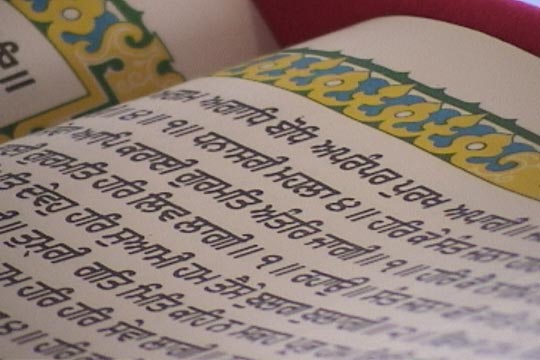 Blogged by: Mewa Singh
Blogged by: Mewa Singh
In celebrating 300 years of our Guru Granth Sahib, I thought it might be worthwhile to republish an essay I had written for the Jakara Movement‘s inaugaral issue of its J.Khronicles magazine. Hope you enjoy….
Sri Guru Granth Sahib: The History of the Sikh Soul
Based on the work of the prolific Puran Singh
As the 10th Guru breathed his last, his Sikhs asked him who would be the next leader of the Sikh Nation. Guru Gobind Singh replied that they should put their trust in the infinite wisdom of the Guru Granth and the collective leadership of the Guru Panth. Together, Granth-Panth is the final Guru of the Sikhs. While every Sunday, we bow to the Guru Granth Sahib, how many of us have ever taken the time to understand what has been gifted to us? We are told to respect the Guru Granth Sahib, but don’t even know what it contains nor even have attempted to understand?
Here are some of McCain’s Muslim supporters standing up to Muslimophobia (pagh salute: Chapati Mystery), as well as a campaign delegate, correctly, standing against such behavior.
In America, Sikhs are ‘racialized Muslim.’ Despite Sikhs’ attempts at differentiation from Muslims, they do not wield the power in this society to create the categories. Thus, Sikhs, despite their attempts, do not have the agency to to negotiate some ‘non-racialized Muslim’ identity. The people that usually engage in vandalism, verbal threats, and even physical assaults usually don’t care to have a history lesson.
The Presidential election is two weeks away, and before we vote, we should know where the candidates stand on issues, not just whose campaign style we like. Below is a summary of the candidates’ positions on a selection of issues (compiled by the Associated Press). For more detailed information on their positions, check out the McCain and Obama websites.
ABORTION
McCain: Opposes abortion rights. Has voted for abortion restrictions permissible under Roe v. Wade, and now says he would seek to overturn that guarantee of abortion rights. Would not seek constitutional amendment to ban abortion.
Obama: Favors abortion rights.
AFGHANISTAN
McCain: Favors unspecified boost in U.S. forces.
Obama: Would add about 7,000 troops to the U.S. force of 36,000, bringing the reinforcements from Iraq. Has threatened unilateral attack on high-value terrorist targets in Pakistan as they become exposed, “if Pakistan cannot or will not act” against them.
The Christian Science Monitor recently ran a story on how the Democratic Party is outpacing Republicans in polls among people of faith [Hat tip, Ennis]. The article emphasized how norms have changed between generations, and how values have realigned towards inclusivity among younger voters who identify with a faith community:
…young adults are more open to religious diversity and cooperation, they are less likely to say that one has to believe in God to be moral…
Young voters are much more inclined to support a larger government that provides more services (57 percent versus 45 percent of the overall population).
Young adults support government involvement most in regard to helping the poor and the environment.
Does this mean we’re seeing a shift against the “Culture Wars” of the Reagan-era? Voters across the board ranked wedge issues — including mariage equality and abortion — at the bottom of their political concerns. In the context of today’s uncertainty, it’s not surprising that people would be more concerned about health care and the economy. That said, I wonder if this shift away from “values” debates indicates a permanent trend for young voters.
While the survey’s analysis focused on divergences between Catholics and Evangelicals, a part of me wonders how much increasing religious diversity in the country has pushed against absolutist morality. Younger voters have shifted their prescription for the government’s role (or non-role) in regulating morality. These voters are also re-opening the door for how we define morality, whether multiple meanings can co-exist, and whether or not these meanings must be rooted in a faith identity or context.
It’s a traditional part of going to gurdwara — giving a dollar (or some other amount of money) as an offering before bowing down in front the Guru Granth Sahib.  Some may not think about this much, aside from how much they would like to offer and what they would like to think about before the Granth. For me, this practice is a bit more complicated. For years now, when I go to gurdwara, I consider not only the amount to offer, but the condition and source of the paper bill itself. Allow me explain:
Some may not think about this much, aside from how much they would like to offer and what they would like to think about before the Granth. For me, this practice is a bit more complicated. For years now, when I go to gurdwara, I consider not only the amount to offer, but the condition and source of the paper bill itself. Allow me explain:
When I go to, say a fast food “restaurant” or other business where cash is exchanged, I will look into my wallet and will feel a bit “bad” if the dollar bill I am handing over to vendor is crumpled, torn, held together by tape, or has excessive writing on it. For example, there is a $10 bill in my wallet now that has been there for weeks — I have been hesitant to subject a business to its possession. Some may view such reluctance as unnecessary.
But the situation changes dramatically, in my opinion, when we are talking about providing money to a gurdwara, as part of bowing down and expressing love and respect to our living Guru.
Okay, so I know that many of you would rather stick something sharp in your eye than have to watch Oprah. 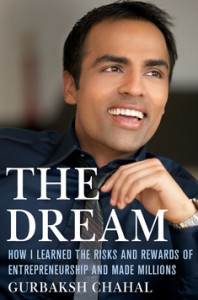 Stay away from sharp objects today then because the word is (thanks M) that Oprah will be interviewing self-made millionaire Gurbaksh “G” Chahal about his memoir The Dream being released later this month [side note: Oprah’s website clearly says her show today is about rudeness so I don’t know what the connection is?!]. For those of you who missed the news a few months ago, Gurbaksh (he actually goes by G because he says he doesn’t have the “easiest first name to pronounce”, but since we can actually pronounce it, we’ll use it) is the 26-year-old founder of ad network BlueLithium and, more recently, the ecommerce startup gWallet. Gurbaksh received much media attention when he sold BlueLithium to Yahoo last year for $300 million. From his website,
Stay away from sharp objects today then because the word is (thanks M) that Oprah will be interviewing self-made millionaire Gurbaksh “G” Chahal about his memoir The Dream being released later this month [side note: Oprah’s website clearly says her show today is about rudeness so I don’t know what the connection is?!]. For those of you who missed the news a few months ago, Gurbaksh (he actually goes by G because he says he doesn’t have the “easiest first name to pronounce”, but since we can actually pronounce it, we’ll use it) is the 26-year-old founder of ad network BlueLithium and, more recently, the ecommerce startup gWallet. Gurbaksh received much media attention when he sold BlueLithium to Yahoo last year for $300 million. From his website,
G was born in the town of Tarn Taran, near Amritsar in Punjab, India to Avtar and Arjinder Chahal. In 1985, his parents received a visa for America through a lottery-based system in India, and the following year, when he was four, the family settled in San Jose, California. His parents had arrived with only $25 to their name, and they struggled at menial jobs to make a future for their four children. For the Chahal family, as for many immigrants, education was paramount, but G left high school at sixteen to form Click Agents, an Internet advertising company, which he sold two years later for $40 million.
Sundari’s recent post, addressing the portayal of Sikhs in an ad for the upcoming Spinning Wheel festival, brings up an interesting tension for Sikh women- the conflict between modern ideals of beauty, and the requirements of the Sikh faith.
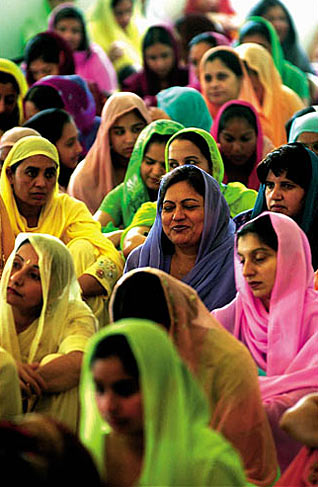 Generally (and unfortunately) women tend to value themselves (whether consciously or unconsciously) according to social valuations placed upon women… which revolve mostly around ideas of outer beauty- trends which vary a bit across region and time, but are all generally superficial. Women who have completely overcome this unconscious embrace of ideals of beauty are extremely rare. For those who think is untrue- think about how many times you’ve heard a female friend talk about the bad day she was having- many of the complaints probably had something to do with the way she felt she looked that day (that might not be the best example, but it’s the first that comes to mind). How we feel is too closely related to how we feel we look.
Generally (and unfortunately) women tend to value themselves (whether consciously or unconsciously) according to social valuations placed upon women… which revolve mostly around ideas of outer beauty- trends which vary a bit across region and time, but are all generally superficial. Women who have completely overcome this unconscious embrace of ideals of beauty are extremely rare. For those who think is untrue- think about how many times you’ve heard a female friend talk about the bad day she was having- many of the complaints probably had something to do with the way she felt she looked that day (that might not be the best example, but it’s the first that comes to mind). How we feel is too closely related to how we feel we look.
These social valuations of beauty are especially problematic for Sikh women in particular because these values are totally opposed to an important part of Sikh identity- our kesh. They are also problematic for all women because we’re not valuing what really matters- our thoughts, ideas and actions which really create who we are- but a superficial farce. Finally, these valuations are problematic because many modern ideals of beauty are unhealthy (but enough has been said about these last two points in general gender conversations that I don’t want to dwell on them).
The challenges and overt racism that Sikh men face in the US today because of their kesh are undeniable. But the solutions that address men’s kesh (mostly political responses, creating social awareness) don’t carry over as solutions for women.
